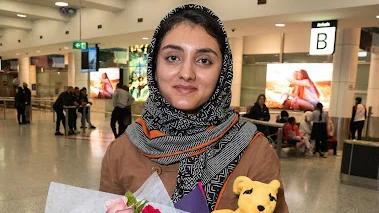A full year after the fall of Kabul to the Taliban, Afghanistan’s female flag-bearer from the past two Olympic Games has arrived in Australia as her extraordinary life takes another dramatic twist.
On a Friday night in late July 2021, Kimiya Yousofi ran a personal best of 13.29 seconds in the women’s 100 metres heats at the Tokyo Olympic Games.
Two weeks earlier she had carried the national flag of Afghanistan into the opening ceremony.
Two weeks later all hell broke loose in her country, with women athletes forced to flee, fearing for their lives, as the Taliban once again seized control in the capital Kabul, taking the presidential palace.
Now, after months of relentless lobbying from the Australian Olympic Committee (AOC), Yousofi, her mother and one of her three brothers have arrived in Australia to start a new chapter.
“I am very excited to be here,” Yousofi told The Ticket in the arrival hall at Sydney’s international airport.
“I am essentially starting a new life, but because my two brothers weren’t granted visas I hope the Australian government can grant me this wish, so my family can be complete.
“Thank you very much to everyone who was involved, it’s been a journey to get here but I am very happy to be here.”
More than 100 other female athletes and their families arrived in Australia shortly after the Taliban installed itself as the government in Afghanistan, after a brazen rescue coordinated by a small team of Australians working day and night, some out of hotel quarantine rooms having just returned from the Tokyo Games themselves.
Yousofi was not part of that group, and in danger of being forgotten in a no-man’s land.
Alongside her parents, she fled Afghanistan as a young girl after the Taliban first came to power in 1996.
Living in exile in Iran, Yousofi was identified by Afghanistan’s government as part of a talent search looking for female athletes ahead of the Rio Olympics in 2016.
Yousofi had little access to competition and facilities in Iran because of restrictions placed on Afghan refugees, but she was good enough to gain selection for the Olympic team, becoming Afghanistan’s flag-bearer at Rio 2016 and Tokyo in 2021.
“Though my country still has many issues, I will prove to the world that we are striving,” she told Afghanistan’s Tolo News at the time.
Nobody had any idea that the women athletes of Afghanistan, like the judges, doctors and school teachers, would so quickly have to give up the gains they had made in the past two decades, sent back to the obscurity of their own homes after the Taliban returned to power.
While Afghanistan’s national women’s football team settled in Victoria, with other families from other sports sprinkled around Australia, Yousofi was in a dangerous position in Iran.
In late August a cousin in the US made contact with the then-president of the Australian Olympic Committee, John Coates, asking for assistance in obtaining a humanitarian visa. It was a logical step, Yousofi is an Olympian, Australia has an embassy in Iran, while the US does not.
Security expert Neil Fergus, who had been crucial in getting dozens of others to safety weeks earlier, had heard reports of Afghan refugees being robbed and murdered after crossing into Iran. At the time the UN estimated there were 780,000 registered Afghan refugees in Iran and another 2 million undocumented refugees.
More than 30,000 had been pushed back into Afghanistan, a situation that would lead to “catastrophic consequences”, according to Fergus.
In November he alerted the AOC to Yousofi’s predicament.
AOC CEO Matt Carroll, and government relations adviser John Lamont, ramped up their already relentless advocacy for Yousofi to be granted a humanitarian visa.
In the meantime, Fergus’s colleagues at Intelligent Risks provided logistical and emotional support and coordinated the financial support offered by the AOC.
Yousofi could not thank them enough as she came through the immigration doors at the airport where a small team from the AOC and IR were there to meet her.
“Thank you so much, thank you to the government of Australia, and Olympics Australia, and everybody that has helped me and my family to be here,” she said.
She has aspirations of continuing her athletic career and exploring every opportunity to compete at a third Olympic Games in Paris 2024.
“Tokyo was one of the greatest moments of my life. I was so happy to be there to represent my country and I’m going to keep trying,” she told the ABC.
Loading
“I’m going to be training very, very hard … I am very excited about going to the next Olympic Games in Paris, so I’m definitely going to keep competing.”
She does not know whether there will be an official Afghanistan Olympic team in Paris or whether she might gain selection in the International Olympic Committee’s (IOC) Refugee Team.
Australia’s Olympic boss is already investigating how best to support Yousofi’s ambitions.
“The AOC understands that Kimiya wants to compete at Paris 2024. We will support her in this with our member sport Athletics Australia and I have already contacted the IOC for their advice and assistance,” Mr Carroll said.
Meanwhile, Afghanistan’s Olympic officials are included in more than 300 members of the Olympic family that have been issued with humanitarian visas to leave the country.
Only weeks ago IOC officials and Afghan Olympic members met with Kabul-based sports officials in Doha, a neutral city that has long been used by the Taliban as a venue for talks.
“The Afghan representatives reiterated their commitment to fully respect the principles and rules of the Olympic Charter, in particular the fundamental right all individuals, including women and young girls, to access and practise sport safely, without discrimination,” an IOC statement said.
The IOC will continue to monitor whether this commitment is being upheld.
An emergency aid package of up to $US560,000 has also been made available to around 2000 athletes, coaches and officials inside Afghanistan for basic needs in guaranteeing they can continue to train and prepare for competition, although whether this is actually happening for female athletes inside Afghanistan is unknown.
Disbursement of the IOC’s funds is coordinated through the UNHCR’s regional office.
Members of Afghanistan’s National Olympic Committee, some of whom now reside in Switzerland, say they are committed to fielding a team of men and women at the Paris 2024 Games.
Whether the Taliban government inside Afghanistan will support that proposition is yet to be seen.
For Kimiya Yousofi though, she has twice represented the country of her birth at the Olympics while living in Iran.
There is every possibility she will represent the country again, but this time from her new home in Australia.





















Discussion about this post